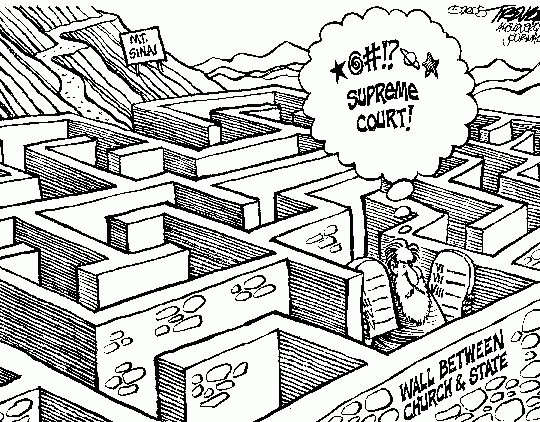
What these persons fail to understand is that it would have been redundant to include such a phrase [separation of church and state] in the Constitution. The document as a whole embodies the view that government is not to meddle in religious matters. The federal government is given very specific, limited powers only over various secular matters. It has no powers relating to religion. The government is secular both in its origin (the consent of the governed) and its function. The government and religious institutions are completely separate and have nothing to do with each other. To insist that the Constitution doesn’t mandate separation of church and state because it doesn’t contain that phrase is more preposterous than a person who is not named as a beneficiary in a will insisting he has a claim on the estate because the will does not specifically exclude him by name.
— Dr. Ronald Lindsay, The Necessity of Secularism: Why God Can’t Tell Us What to Do, December 2014
Purchase The Necessity of Secularism: Why God Can’t Tell Us What to Do

We have the Establishment clause in the Constitution but separation of church and state is what is used to describe the function and intent of the Establishment clause. Unfortunately, there’s a false narrative about USA being a Christian nation that has influenced government in recent decades.
“Separation of church and state” isn’t in the constitution, but it doesn’t come from no where, it comes from a letter from Thomas Jefferson to the Danbury Baptists. (Yes! When the Baptists were in the minority, they actually liked separation, imagine that.)
Here is the meat of that letter:
Believing with you that religion is a matter which lies solely between man and his God, that he owes account to none other for his faith or his worship, that the legislative powers of government reach actions only, and not opinions, I contemplate with sovereign reverence that act of the whole American people which declared that their legislature would “make no law respecting an establishment of religion, or prohibiting the free exercise thereof,” thus building a wall of separation between Church and State. Adhering to this expression of the supreme will of the nation in behalf of the rights of conscience, I shall see with sincere satisfaction the progress of those sentiments which tend to restore to man all his natural rights, convinced he has no natural right in opposition to his social duties.
The Constitution mentions religion by name only once, and that is no religious test shall be required as a qualification for any federal office. Seems to really clarify the framers’ true feelings about “no wall of separation.”